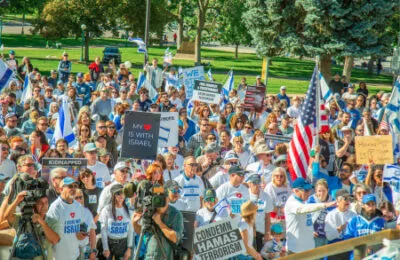WASHINGTON In addition to Americans and Britons, the terrorists sought out Israelis. In addition to popular tourist hot spots, the terrorists raided a well-known gathering place for Jews.
The conclusion, according to Israeli Foreign Minister Tzipi Livni, is as plain as the pain that Israelis and Jews worldwide feel after attacks in Mumbai that left more than 140 dead, including five residents of that city’s Chabad House: extremist Islamist hatred does not stop at Israel’s shores.
“In India or elsewhere, there are extremist Islamic forces who dont accept our existence, or the Western way of life,” Livni said at a news conference in Jerusalem in which she confirmed that five Israelis were killed at the Chabad House. “It’s a shame that this kind of event must remind part of the Western of the world about this reality. The target is not just Israel, but the West.”
Rabbi Levi Shemtov, the director of American Friends of Lubavitch, confirmed to JTA that two of the dead were Rabbi Gavriel Holtzberg and his wife, Rivka, who directed the Chabad House. Rabbi Holtzberg was a dual U.S.-Israeli citizen; Rivka was Israeli. The identities of the other three Israeli casualties were not released. Earlier, a cook from Chabad House fled to safety with the Holtzbergs’ 2-year-old son, Moshe.
The Chabad house is located at 5 Hormusji Street in Mumbai at a site known as Nariman House. India is a popular destination for young Israeli backpackers, who often make the trip after their compulsory army service. The Holtzbergs moved to Mumbai from Brooklyn, New York, in 2003 to do Jewish outreach work in India.
Livni said in her news conference that all but five Israelis were accounted for. At the time of her statement, at 5 P.M. in Israel, Indian commandos were still cleaning out the building at Nariman House, and further information was unavailable. Indian and Israeli security forces were said to be cooperating closely. Israel Radio quoted Indian security officials as saying that the five Israeli dead were evidently killed at the outset of the attacks and not during the commando raids.
Gunmen armed with automatic rifles and grenades struck 10 separate locations in Mumbai on Wednesday night in coordinated attacks at sites frequented by Westerners, including hotels, restaurants and a railway station.
The terrorists also took hostages at the Taj Mahal Palace and Trident-Oberoi luxury hotels. Close to 150 people are dead, according to the latest reports, and hundreds are injured. A little-known organization calling itself the Deccan Mujahideen has claimed responsibility for the coordinated attacks.
The evidence suggested that Jews were targeted deliberately, Livni said: Terrorists raiding hotels sought out American, British and Israeli citizens for capture; and the Chabad House is tucked away at the end of an alley, suggesting that the raid there was not happenstance.
The group claiming responsibility is not well known, having taken responsibility for only a single prior attack. Its grievances were local, but its terrorist tactics are part of a global pattern that includes the most virulent strand of Israel-hatred.
“We have no doubt that the targets of the terrorists were Jewish and Israeli as well as American and British,” Livni said.
Israel and India have shared common security interests in recent years, and India has become a leading buyer of Israeli arms and weapons technologies. Security teams from both nations happened to be meeting in New Delhi on Sept. 11, 2001; they turned on the TV and watched the attacks in the United States, sharing assessments together.
It’s a natural fit between the world’s most populous democracy and one of its smallest, said Jason Isaacson, the American Jewish Committee’s director of international affairs.
“There’s been close cooperation and consultation between India and Israel on counterterrorism and security,” Isaacson told JTA on Friday, after spending 36 hours in nearly nonstop consultations with AJC’s representative in India, Priya Tandon, as well as with senior Indian, Israel and U.S. government officials.
“This is a further reminder that all democracies face the threat of Islamic extremism.”
India, a vast multicultural society, has welcomed Jews for centuries, perhaps as far back as the destruction of the Second Temple. Many believe that India’s first Jews were shipwrecked refugees from the Roman expulsion in 70 C.E.
“There is no fertile ground for anti-Semitism” in India, Isaacson said. “It’s a multiethnic society where Jews have always been comfortable and welcomed.”
Relations were cool during the Cold War, when India’s then-ruling Congress Party assiduously pursued non-aligned status. In the wake of the collapse of the Soviet Union at the end of the 1980s, India expanded ties with Israel, upgrading its Tel Aviv consulate to an embassy and developing robust relations with the Jewish state.
A key element to the relationship has been close ties with U.S. Jewish organizations, particularly in the pursuit of a closer relationship with the U.S. defense establishment. For Washington-area Jewish officials, a must-go-to event in recent years has been the Indian Embassy’s Chanukah party.
One component of that relationship was the establishment of the Chabad House in Mumbai. In a sign of U.S. sensitivity about the relationship, Shemtov, Chabad’s Washington representative, received calls of concern this week from Josh Bolten, the White House chief of staff, and Joe Biden, the vice president-elect, Shemtov said.















